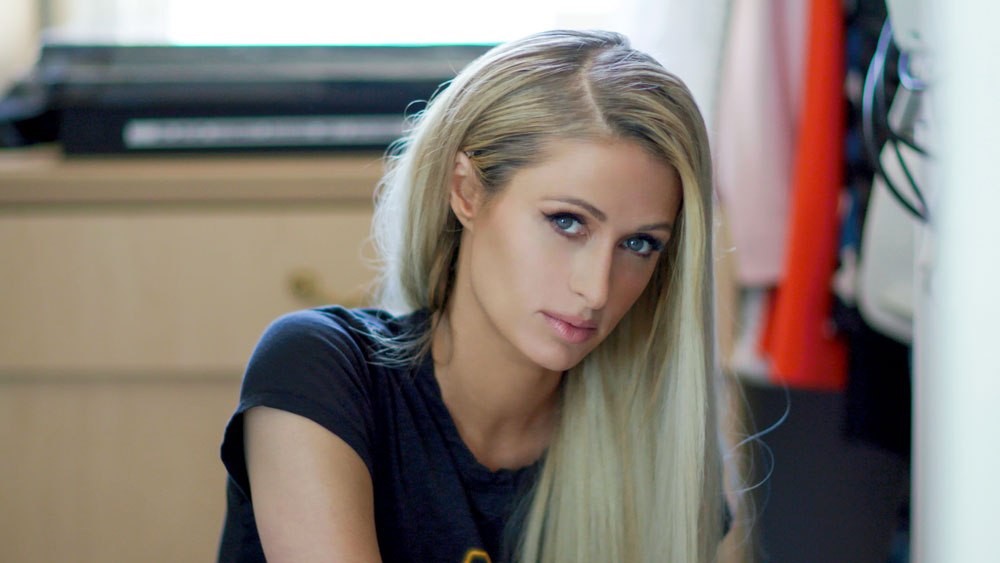Paris Hilton, formerly the most famous person in the world. With This Is Paris, the documentary format breaks the character facade portrayed by the 00’s icon, revealing her true deep-voiced self.
It’s hard not to go into a viewing like this without cynicism fizzing through your brain. Paris is a media darling and knows exactly how to guide a story while playing coy. The promotion for this documentary has been nothing short of a heavy handed rebranding exercise, repositioning her image which has been stifled from its conception. It’s something she’s been desperate to execute and achieve for over a decade now, including in her previous “tell-all” documentary, 2009’s (incredibly titled) Paris, Not France.
This documentary works perfectly as a way to reintroduce her to the general public, considering she hasn’t been socially relevant since the 2000’s. Paris Hilton’s celebrity reached its supernova moment in 2007 when she was sentenced to 45 days in jail. News anchors were ripping up their scripts mentioning her on live television, newspapers were taking week long breaks from reporting her latest updates. It was a level of overexposure very few have ever experienced. When she was released from jail, she strutted out wearing a pair of jeans from her soon-to-be-launched Paris Hilton clothing line, being met by frenzied paparazzi flashes. As she reached the pitch black SUV and embraced her mother, one can’t help but look at this as being the moment her celebrity ended.
Paris was a figure so vehemently detested, and seeing her have a happy new chapter was something the world didn’t want to see. They wanted to see her fail, and aside from a grisly death, wasting away in a jail cell was the next best thing. That may sound harsh, but reflect back on the narratives of the 00’s icons, Britney Spears and Lindsay Lohan too, with their pre-prepared obituaries.
2000’s media didn’t want redemption, they wanted fatalities.
Paris lived to tell the tale, but this isn’t the story she tells in This Is Paris.
Instead it jumps more than a decade from the peak of her stardom to where she is in recent years. This ultimately proves to be a smart decision made by director Alexandra Dean. The story told in This Is Paris is that of her trauma. She begins to process the abuse she experienced at school, and reflects on how it’s melded with every aspect of her life. Yes, the story of the abusive behaviour schools is one of horror and importance, but I believe the true story of this film is the relationship between Paris and her mother, Kathy. I’d even argue This Is Paris could be viewed as a confessional from daughter to mother.
Paris mentions the resentment she felt toward her parents when she escaped the school after a hectic eleven months. Paris was keen to quickly forget her experience though, and one sure way to overcome a trauma is to delve deeper into it so you don’t need to recognise it as an exclusive. You can’t focus on what you’ve been through if you’ve got more mayhem to keep you in the present. The partying, and especially the drugs (something not mentioned in the documentary despite being well documented) was the obvious (if not cliché) response to what Paris had lived through.
Despite some details omitted, the documentary makes Paris’ rebellious side quite apparent. Kathy is keen to use it as validation to support her decision of exiling Paris. From her tomboy childhood, to her club kid teen years, to her moment as David LaChapelle’s muse, she’s always been an independent spirit, even with her life ambitions. But there’s still a part of her so overwhelmed with being all that she isn’t. The crux of their relationship turmoil is revealed when Paris tells the audience that Kathy wanted her to be a Hilton, while she just wanted to be Paris.
Throughout the documentary her constant reference to and distinction of the Paris Hilton character quickly exhausts itself. It’s a script she’s been repeating for over a decade. It may very well be a character, but it’s still an intrinsic part of who she is. She can’t deny that, despite how much easier it is to dismiss all your faults and wrongs when you have a character to blame.
There are moments in the documentary where Paris tells a story and reveals her tendency of offering half-truths. She makes a comment about her vacation being the first one since she was fifteen, when it’s well documented that she has been on many, many, many vacations through the year. She speaks in hyperbole, these exaggerations almost so her story is taken seriously. It doesn’t take much research to find out most of these vacations included Paris performing DJ sets, or making promotion appearances. Working vacations. Half-truths.
Kathy Hilton is privy to Paris’ penchant for doing this as she mentions taking what Paris says with a grain of salt. While it’s understandable, it’s also dangerous grounds to walk, especially when the context of Kathy’s comment is regarding Paris’ nightmares. It could also speak of Kathy’s own inability to recognise what she put Paris through. Yes, she may have had the best intentions when she sent Paris to these schools, but best intentions often have the worst outcomes.
When Paris’ sex tape is discussed, Kathy seems unable to move past the impact it had on her personally. Paris references it as being electronically raped, and rightfully acknowledges how unfairly vilified she was for it. Still, Kathy focuses on how embarrassing it was for her. At another point in the film, Kathy wonders where Paris’ facade stems from. The answer in the documentary suggests it comes from her experience at these schools, but I’d suggest Kathy’s treatment of Paris is where the facade was born from. Paris presents the image she believes Kathy wants her to be.
In what seems to be intended as the films climax, Paris sits down with Kathy to reveal her photo from the #BrokeCodeSilence campaign that lists the impact the school had on her. The emotional, verbal, and physical abuse she went through. It’s a tense and uncomfortable scene as upon reading Paris’ experiences aloud, Kathy barely offers a response. Stone cold, she pauses, before covering her face. Paris sits in silence, awkwardly waiting for a reaction. Kathy offers a meek response that she would’ve been there in one second if she knew, and then it cuts to an embrace between mother and daughter. Paris’ expression appears despondent as they hug, perhaps disappointed by the lack of resolution. What should’ve been a moment of catharsis, instead was anticlimactic and actually rather sad.
While there isn’t resolution between mother and daughter in the documentary, Paris does begin to exhibit some resolution with herself. She begins processing her experience by doing the toughest thing first: acknowledging it. She considers how it has manifested in the relationships she’s had. She acknowledges having had abusive relationships in the past, one in particular as she browses photos of herself bruised and beaten. Photos from the time she was dating Nick Carter. Other tumultuous relationships with her exes are well documented too; photos of Doug Reinhardt strangling her and throwing her phone from a car in 2009, Cy Waits incessant jealousy displayed throughout her 2011 reality series, The World According to Paris.
Victims of abuse often find it impossible to differentiate between tough love and toxic behaviour. Harmful cruelty is accepted as it’s the norm of your life. As long as there are moments of kindness and affection, that’s enough to dismiss any pain you’re put through. It’s a dangerous cycle one falls into, near impossible to break. Paris mentions after her relationship with Chris Zylka she was keen to remain single from then on, and while she’s gone on to have other relationships, sometimes opting for a life of solitude is the only way to protect yourself from a habit of toxic relations. Paris shows a certain tenacity to be able to continue having these relationships. But, with every new man she’s with she follows the same script of voicing that she’s finally found the one. She acknowledges in the documentary she just wants to be loved, and who can fault her for that?
The film ends with Paris refusing to divorce from her own band, which perhaps in its own way is Paris embracing the character she spent the film denying. If her coping mechanisms have been working for this long, who’s to say she should stop? Maybe she’ll reach her goal of making a billion dollars (despite it being a goal only achieved through the exploitation of the working class- not exactly a noble goal to have) and magically find the fulfilment she’s so obviously lacking. Paris Hilton is undeniably who she is, her greatest hope for fulfilment is coming to terms with that. That includes her ugly side.
Yes, you can watch his film cynically as a rebranding exercise; an effort to garner sympathy from an audience that hasn’t been engaged with Paris for a good while. Sure, her celebrity and history are easy to be distracted by. But, the story and themes here are interesting enough on their own accord. Alexandra Dean has managed to craft a decent examination that does reveal Paris Hilton unlike she’s been seen before.
It’ll be interesting to see what revelation Paris has in next decades tell all documentary.
Director: Alexandra Dean
Featuring: Paris Hilton, Brandi Glanville, Sheeraz Hasan



